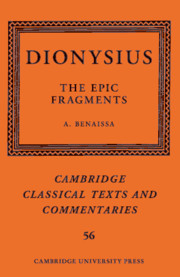Book contents
Introduction
Published online by Cambridge University Press: 01 February 2018
Summary
DIONYSIUS’ DATE
Virtually nothing can be said about the person of Dionysius. Because his fragments share several expressions and elements of diction with Oppian's Halieutica (composed c. 177–80 CE), and a papyrus of his Gigantias (P.Oxy. 2815) is securely assigned to the second century CE, it has been inferred that Oppian was the imitator of Dionysius rather than the other way round, and that Dionysius lived prior to the middle of the second century CE. The terminus ante quem may be pushed a little further back in view of Bass. frr. 39–40, written on a papyrus from Oxyrhynchus originally assigned to the late first or early second century CE. If this palaeographical dating is correct, Dionysius’ floruit could not postdate the turn of the second century, so as to allow time for his work to find its way to Oxyrhynchus by the end of the first quarter of the second century at the latest. Recently, however, a slightly later redating of the papyrus to the mid to late second century has been proposed, making it inconclusive testimony. There is no precise indication in the poems of a terminus post quem, except for the imitation of some expressions of Nicander, who probably lived in the second century BCE. In the present state of the evidence, Dionysius could have flourished either at the end of the Hellenistic period or in the early Imperial period. Agosti (2001) 136–42 sees in the sensationally macabre contents of Bass. fr. 33v, with its suggestion of human sacrifice and cannibalism, a reflection of the literary tastes of the Imperial age. From this perspective, it might be preferable to anchor Dionysius in the first century of our era rather than earlier, but this must naturally remain an impressionistic argument. Bass. fr. 28* may suggest a date after the reign of Vespasian (69–79 CE), depending on how its relation to Paus. 8.29.3–4 is interpreted (see commentary).
- Type
- Chapter
- Information
- Dionysius: The Epic Fragments , pp. 1 - 80Publisher: Cambridge University PressPrint publication year: 2018

